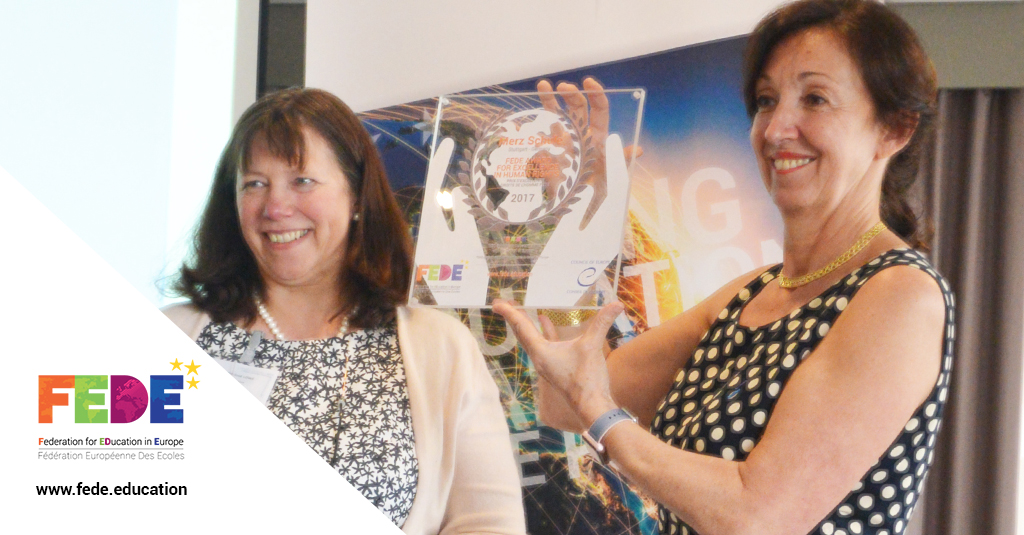On the occasion of the FEDE 2017 General Assembly held in Lisbon, Portugal, Claude Vivier Le Got, the FEDE Chairwoman, presented Marie-José Löwe, a representative of Merz Schule in Stuttgart, Germany, with the 2017 FEDE Award for Excellence in Human Rights.
This award recognises initiatives taken by FEDE students, faculty members and FEDE schools with regard to human rights. It highlights outstanding projects that help to effectively promote the founding principles and human values of the Universal Declaration of Human Rights.
“It is our mission to make the values that federate and bring us together a day-to-day reality: the values of peace, non-discrimination, equality, justice, non-violence, tolerance and respect for human dignity. It is our desire that these values, those of human rights, enrich all of the learning experiences in FEDE schools as we are convinced that they enhance the quality of the education and contribute to peaceful coexistence,” explained Claude Vivier Le Got, Chairwoman, and Farhang Ghassemi, elected member of the FEDE Committee, delegated to human rights for this ceremony.
The winning project of 2017 is a project supported by 7 German students from Merz Schule as well as their teacher Marie-José Löwe.
For several months, these students worked on the human rights theme and on women’s rights in particular by using a film (“The Girl”) to convey their inalienable right to life, security, liberty, dignity, as well as physical and emotional integrity.
“There is no denying that many girls go through hell every day. In quite a number of countries, they are forced to undergo mutilation, suffering that is so bad that they could even die. Those who look away become guilty themselves. We wanted to be the voice of all of those who do not have one,” explained Anastazia, Isabella, Chiara, Luisa, Stephania, Pauline and Milica, the students who won the award.
Speech by Marie-José Löwe, Member of the FEDE Committee, Representing Merz Schule in Stuttgart, Recipient school of the FEDE Award for Excellence in Human Rights.
An award ceremony is always a singular event, for the students of course, who gave the best of themselves to obtain their award, but also for the teacher who assisted the young people.
Especially now, in addition to being FEDE award winners, our students have become true ambassadors of our school, the Merz Schule of Stuttgart/Germany, the establishment that trained them.
I am deeply moved by the FEDE jury’s choice of our film as a contribution to this major European project and by its earning of the “human rights” excellence award.
I want to further stress this international dimension, or even European, as it is young Germans aged between 13 and 15 years old who wrote the script, made the film in French, a second or third foreign language.
It is also because the French language is not the language of only one country. It is a language that fits everywhere.
These young girls applied their talents and skills to serve a society which needs to change, which should fight for human rights, particularly women’s rights, as there is no denying that many girls, women go through hell every day. In quite a number of countries, they are forced to undergo suffering that is so bad that they could even die. Those who look away become guilty themselves.
My young pupils also made this film in memory of all of these girls subjected to this suffering, inflicted with abuse, beaten and mistreated.
My pupils wanted to be the voice of all of those who do not have one. Women, girls have the right to fundamental values: women’s right to life, security, liberty, dignity, as well as physical and emotional integrity.
I would like you to know that I am proud to be participating in this ceremony and pleased to be going back with this award that is so precious to my young people.
I thank the FEDE and its Chairwoman, Claude Vivier le Got.


